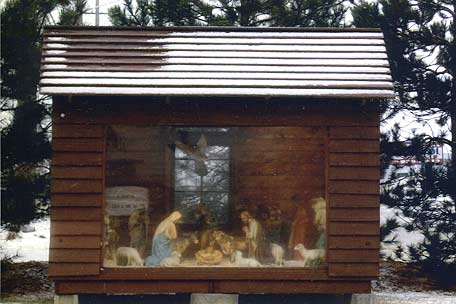 John Satawa is a longtime resident of the City of Warren, Michigan, and a practicing member of the Catholic Church. For over 60 years, Satawa and his family had displayed a nativity scene – or crèche – during the Christmas season on the public median between Mound and Chicago Roads in the City of Warren, Michigan.
John Satawa is a longtime resident of the City of Warren, Michigan, and a practicing member of the Catholic Church. For over 60 years, Satawa and his family had displayed a nativity scene – or crèche – during the Christmas season on the public median between Mound and Chicago Roads in the City of Warren, Michigan.
There had never been a single complaint about the display until December 2008, when the Macomb County Road Commission ordered Satawa to remove his crèche within 30 days because he did not have a permit. The Road Commission’s order to remove the crèche was in response to a written requestthey received from the Freedom from Religion Foundation, a secular atheist activist organization.
On February 12, 2009, Satawa submitted a permit application that set forth the details of his proposed crèche display, including photographs to show its size and location, and to demonstrate that the display would not obstruct any vehicular or pedestrian traffic or create any public safety issues.
On March 9, 2009, the Road Commission issued a “formal denial” of Satawa’s permit application. According to this denial, which is the only formal explanation provided by the Road Commission and the Commissioner for denying Satawa’s permit request, the basis for the denial was because the crèche “displays a religious message.”
Accordingly, on October 23, 2009, AFLC Co-Founder and Senior Counsel Robert Muise, on behalf of Satawa, filed a lawsuit against the Road Commission and the Commissioner, alleging violations, among others, of the First and Fourteenth Amendments to the United States Constitution. Controlling law establishes that Satawa crèche display constitutes speech protected by the First Amendment. Furthermore, any government action that discriminates against a person based on the exercise of his fundamental right to freedom of speech, as in this case, violates the equal protection guarantee of the Fourteenth Amendment.
After the lawsuit was filed, the Road Commission asserted “safety concerns” as a basis for denying the permit. As demonstrated by undisputed record evidence, these concerns were without merit: the Road Commission’s own expert testified that the crèche display did not violate any of the applicable safety standards. In fact, it is undisputed that at no time prior to the lawsuit was Satawa ever informed by theRoad Commission that his crèche caused any safety issues. Indeed, the crèche caused no accidents during the 60 years it had been displayed at this location.
On October 30, 2009, Satawa filed a motion for a temporary restraining order / preliminary injunction, seeking an order to permit his nativity display during the 2009 Christmas holiday season. On December 28, 2009, three days after Christmas, the district court denied Satawa’s motion. On April 19, 2010, the court entered an opinion and order granting the Road Commission’s motion for summary judgment and denying Satawa’s motion, and a judgment was subsequently entered in favor of the Road Commission.
Muise has appealed that ruling to the U.S. Court of Appeals for the Sixth Circuit on behalf of John Satawa. You can read the briefs he filed here and here. Oral argument for the case is scheduled for May 30, 2012.
On August 1, the U.S. Court of Appeals for the Sixth Circuit ruled in favor of Mr. Satawa. According to the court’s opinion, the Road Commision violated Satawa’s right to freedom of speech and deprived him of the equal protection of the law by denying his permit request.
CASE UPDATE (August 1, 2012): The U.S. Court of Appeals for the Sixth Circuit issued its opinion, ruling that the Road Commision violated Satawa’s right to freedom of speech and deprived him of the equal protection of the law by denying his permit request. Read the opinion here.
CASE UPDATE (October 18, 2012): AFLC filed motion with Michigan federal court, requesting injunction to display nativity scene based on favorable 6th Circuit ruling. Read the motion here. The injunction was granted. The nativity is on display once again. The Road Commission paid our attorneys’ fees. Case closed.
